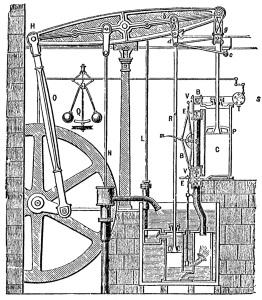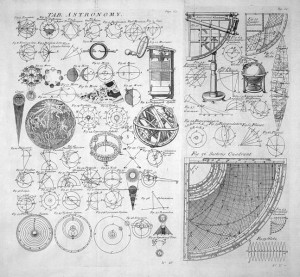“Soviets plus electrification,” proclaimed Lenin, “equals communism”.
Even allowing for the simplifications inherent in sloganeering, Lenin’s quip does capture a version of the optimism, even faith, that his generation of socialists had in science and its essential compatibility with the socialist project.
One of the justifications for socialism, apart from its intrinsic ethical superiority, was its claim that it would be a more rational way than capitalism of organising economic life.
It is hardly surprising, therefore, that such a pro-science culture would see leading socialists double up as scientists — Pannekoek was an astronomer, Kropotkin a geographer — while eminent scientists such as Haldane threw their lot in with the radical left.
More importantly, the classical Marxists, in particular, saw themselves as applying a scientific analysis of society: not for them an uninformative litany of the deeds of the great men of history. Rather they looked at the underlining tendencies that governed social life.
However, in recent decades many radicals have adopted a more sceptical stance towards science itself. It is worth looking at why and whether it is a useful approach. The first port of call is the extremely close relationship between research areas and the funding supplied by business and the state, particularly the military.
For instance, genetic modification holds out the possibility of a tremendous increase in humanity’s control of the environment, which could only have arisen out of a long process of scientific investigation in a range of disciplines. So far, so good. The drawback is that many of the products of this publicly funded, decades long research project will be owned by private corporations, some of them with a less than stellar record, e.g. Monsanto of Agent Orange fame.
Monsanto’s control of genetic stock has vast repercussions for agriculture. Whereas traditionally, farmers control their own genetic stock, in the form of the previous crops, if a corporation like Monsanto came to dominate the seed market, it would entail a transfer of ownership of one of the most important means of production out of the hands of the farmers and into the hands of the shareholders of Monsanto.
Whether or not these genetic modifications are beneficial or not is less material than the fact that they are used primarily to improve Monsanto’s domination of the market. Leaving aside the ecological implications of genetic modification, it is clear that the near monopoly on genetically engineered products gives companies like Monsanto a great deal of power.
The dubious interaction of scientific research and business is even more starkly illustrated by the research priorities of Pharmaceutical corporations. Even the billionaire Bill Gates has put forward the question: Why do we care more about baldness than malaria?1 Somewhat surprisingly he lays the blame squarely at the feet of the profit motive. Pharmaceutical companies are not in fact maximising outcomes for humans generally, but merely trying to maximise their bottom lines, which are not the same thing. There are even virulent diseases that could easily spread from the undeveloped world to the developed world, so it isn’t even merely a question of focusing only on the welfare of the developed world. Instead it’s the raw calculation of profit.
The nexus between capitalism and science reaches almost absurd levels with the patenting by corporations of the research conducted at universities and funded by the public purse only to be handed over, under the fiction of public-private partnerships, to companies like Cisco and IBM.
And then there is the military, perhaps the greatest sugar daddy of them all, even of seemingly crazy projects, such as a total surveillance programme intended to monitor and interpret all electronic communications, as well as more conventional and actually realised ones such as robotic war planes. A surprisingly large amount of recent tech companies originate in military funded research projects, e.g. Apple’s personal assistant software, SIRI.
The imposition of western military power on the less developed societies leaves no room for doubt as to the impact of technological research. Agent Orange poisoned millions, while the aircraft that dominated the skies above Vietnam dropped more high explosives than all sides dropped in World War 2.
There is no question, then, that much scientific research is conducted under the auspices of either capitalist corporations or a military bureaucracy, or both. Even anthropology and psychology have been co-opted by the US military as a means of understanding recalcitrant insurgents and therefore of enhancing the capacity of the military to subdue them. 2
Given this reality, it is not too surprising that radicals question the function of science, its values, and its place in reproducing capitalism itself.
What, then, should the attitude of socialists be to science? Is it, and the rationality that enables it, irredeemably associated with capitalism and militarism? Does science itself entail a sense of entitlement to control nature and a type of rationality that pretends to universalism while in reality serving the interests of a western elite? Does a project of human emancipation need to abandon the very concept of attaining rational knowledge?
Origins
The term “science” gives the misleading impression of a methodology that emerges fully formed and neatly consistent from European culture. But all major social practices evolve and that requires them to evolve from something, and science is no exception. It emerged from folk wisdom and religion, both of which have a long and related history and which is by no means unique to Europe.
Given the level of development of technology in pre-industrial societies, those wondering about how the world was structured were limited in how far their could model the cosmos. One of the more developed fields, astronomy, was useful to understanding the season cycles and was therefore of great value to the early agricultural states. Overall, however, the complexity of social life itself was low enough that the impetus to develop a scientific overview was often quite weak. Additionally, while religious modes of thought, through their contemplation of cause and effect, greatly contributed to the later emergence of science, religions’ structural association with pre-capitalist social forms eventually became a block on developing a more thorough going scientific world view.
Moreover, “science” can give a misleading impression of unity thus belying the rather messier history that characterises almost all complex social phenomena. Today, science is usually conceived as a naturalistic investigation which relies on publicly measurable evidence. There can be subjective mental states which are of high importance to the individual who experiences them, but so insofar as they are not a publicly measurable phenomena their exploration is better conducted in the realm of the arts than in science.
Science is naturalistic in the obvious, but nevertheless frequently overlooked, sense that it isn’t super-naturalistic, that is, it doesn’t appeal to the divine as an explanation. In the absence of divine revelation — much diminished since the 17th century — we must resort to evidence accumulated from experience, usually collective experience. The evidence is weighed up and, if possible, a model is constructed which seeks to structure how we view that aspect of reality. If the model is at all functional it usually yields some predictions of value. [More details in Part II].
This modelling behaviour of aspects of reality long pre-dates modern science. We can see from the most primitive (i.e. non-industrialised) cultures that their populations have highly developed categories of knowledge on aspects that affect their lives. For examples, tribes which engage in hunting and gathering often have extensive knowledge about the plants and animals that inhabit their landscape. The Polynesian explorers of the Pacific Ocean had sophisticated methods of navigating that are clearly of the same kind that later became common amongst Europeans. The influence of Arabic science on early modern Europe is well known while China remained in advance of the West until well into the 18th century. The most notable aspect of science as it emerged in Europe in the modern era is its scale.
 In the ancient world, a small number of men attained the leisure time necessary to contemplate the world. Some of their speculations are of the first order; it is well known, for example, that the Ancient Greeks, mathematically literate and logically rigorous, calculated the circumference of the earth, conceived of the atom, and invented analogue computers. But their technological endeavours were a hobby, not a professional activity in their own right and despite some prodigious inventions (the water mill) they never got on a positive feedback loop that led to rapid technological expansion such as we have had over the last 250 years.
In the ancient world, a small number of men attained the leisure time necessary to contemplate the world. Some of their speculations are of the first order; it is well known, for example, that the Ancient Greeks, mathematically literate and logically rigorous, calculated the circumference of the earth, conceived of the atom, and invented analogue computers. But their technological endeavours were a hobby, not a professional activity in their own right and despite some prodigious inventions (the water mill) they never got on a positive feedback loop that led to rapid technological expansion such as we have had over the last 250 years.
Technology Comes Before Science
The cluster of practices, then, that become the science that we call methodological naturalism— materialism, testing, modelling — emerge from the attempts to understand the world in a socially useful way. Scientific speculations are far from a free floating activity unrelated to the social needs of the time. We tend to think of scientific discoveries resulting in technological applications: electricity and electric cooker; nuclear physics and the atom bomb. And while that is often the case nowadays, the origins are actually the other way around. It was technical progress that prompted the need for science as we know it. The complex navigation requirements of the emerging capitalist world system created a pressure to solve problems of measuring longitude while the creation of economics based on national states fostered the growth of statistics. Science, in other words, emerges as a rough generalisation of the iterative process of technical improvement. But why did it occur in early modern Europe and not in, say, Ancient Greece, which had many justly celebrated discoveries to its name?
The answer lies in the form of economic activity dominant at either time. Capitalism, which emerged in Europe as the dominant mode of production, is very different in key areas than previous economic systems. Whereas the elites of ancient and feudal modes of production did not depend on technical progress to secure their status vis-à-vis their peers, under capitalism they do. This crucial difference raises methodological naturalistic investigation of the world from a hobby to a profession.
The use of slaves and serfs in pre-capitalist modes of production meant there was no structural interests of those with economic power to improve the technology involved in the production process. On the contrary, the structural interest was in war, specifically war which enlarged the elite’s capacity to gain slaves and peasants to work the land. This whole dynamic changes under capitalism, which has to make do with free labour and measures success in terms of profit rather than land.
Each set of capitalists is engaged in a two-front war: against rival capitalists and against their own workers. They can undercut their peers by improving the technical means of production, which enables them to produce more cheaply than their rivals. At the same time, new machinery always weakens the bargaining power of their workers. Indeed, the stronger the workers are organised, the greater the incentives there are for management to introduce labour-saving machinery in order to lessen their dependence on them.
Moreover, once machines become a significant part of the productive process, a positive feedback loop takes hold:
Once machines have been invented that can be used successfully in production, and large free labour forces appear, pressing to be employed in the production and application of machines, the machine becomes one of the most powerful weapons in the competition of the entrepreneurs against each other.
As a consequence machines are constantly perfected and enlarged, the productivity of labour rises, and with it the surplus over wages that it produces; but also so does the need rise to collect, to accumulate, a part of this surplus in order therewith to obtain new and better machines, and the need to expand the market continually, since the improved machinery keeps supplying a larger production to be disposed of. The result is that capital grows continually. The production of means of production occupies a larger and larger place in the capitalist mode of production.3
Firms which do not keep pace with technical developments will find themselves wiped out in the competition for profits. After enough time, only those companies which adopt a highly supportive attitude towards technology will be left. The same applies to states. A minor country like England could defeat vast Empires like Russia and China in the 19th century due to its technological superiority. Both the vanquished had to modernise and adopt methods which they associated with the technological achievements of the western powers.
During the 18th and 19th centuries the methodological naturalism that was paying such dividends for the nascent European capitalist powers became institutionalised in universities and royal societies. It is taken out of the hands of the proverbial butterfly chasing English vicar and thrust into the research labs. This was a gradual process, and took decades if not centuries, but clearly it was one that was selected for: those capitalists and states that supported it proved successful in the international competition with other capitalists and other states. Science was no longer a mere appendage of cultural development, like sculpture or poetry nor weakly associated with fairly primitive means of producing. It became essential to the methodology of production itself, a method which was systematically prone to development. With this shift the entire edifice of the cultural social sphere had to likewise transform itself.
Once the specialised institutions dedicated to practicing methodological naturalism become securely established, it becomes organised methodological naturalism and all the more powerful for it. Just as an organised professional military is vastly more powerful than a gang of ultra-violent but disorganised males, an institution dedicated to naturalistic investigations yields better and more frequent discoveries than the most enthusiastic amateurs. The process of training up scientific apprentices, of valuing empirical evidence, of open publishing and peer review, and, not least, the provision of expensive research equipment raise the pace and quality of knowledge acquisition to a higher level.
Only a mode of production
This brief account of the rise of science from primitive folk wisdom to institutional recognition emphasises its alliance with capitalism. It would still be at the level of an elite hobby were it not for that. But does that not show how deeply and inextricably linked science is with capitalism?
The answer lies not so much with science but with capitalism and how we view its role in society.
Weber conceived of capitalism as a form of instrumental rational organisation geared towards maximising efficiency and his approach was extended by the Frankfurt School and later post-modernist theorists, despite their not infrequent origins in Marxist organisations. That conception has the unfortunate result of lumping capitalism in with Enlightenment thought. To reject one entails rejecting the other. The difference between Weber and those post-modernists lies in what they choose, not in their framing of what that choice is.
Classical Marxism took a different approach. It didn’t view capitalism as an all-encompassing system, but merely as a shorthand for the ‘capitalist mode of production’. Science is clearly influenced greatly by the interests of those who own and govern society. If nothing else, Marxism is famous for stressing the determining role of the mode of production in structuring other social activities. Nevertheless capitalist production remains a distinct activity which is separable from other forms of social life which are distinct from, but not unaffected by capitalism: family life, friendship, art, leisure time. Science is another one.

If there is something you know,
communicate it.
If there is something you don’t know,
search for it.
Engraving by Benoît Louis Prévost.
The old Marxist view of the social world made up of separate but interacting systems is not only in keeping with the evidence, it also is a more politically useful lens through which to view the world. Capitalism is the revolutionary force par excellence and its alteration of the mode of production has freed other social spheres to evolve away from the constraints imposed by agricultural and highly patriarchal modes of production. The gains made in recent decades for women’s equality, for example, arose after women gained a degree of economic power previously unavailable to them while the reproduction of economic structures favoured the induction of women into the capitalist workforce on a permanent basis. It is hard to explain the sudden advances in women’s rights in the last 150 years without recourse to economic changes in their social position. In agricultural societies, equality for women threatens the reproduction of the existing economic social relations; hence the horror expressed by religious reactionaries since the dawn of the Industrial Revolution, particularly evident today amongst Salafi Muslims, who are confronted by the encroachment of capitalist social relations on their long uncontested domain.
For in capitalism there is no such material interest in the suppression of legal equality amongst men and women or between ethnicities or anyone else for that matter; if anything there is momentum to support it since the workforce is expanded (thus weakening labour’s bargaining power, at least in the short term) and the consumer base is consequently enlarged. The decoupling of sexual relationships from the reproduction of economic system enables the former to evolve in ways unanticipated just a few decades ago.
If cultural practices did not arise from and depend on material forces for their reproduction we would expect to see arbitrary practices across societies. Science could theoretically have blossomed in pre-Norman Ireland or female equality in Ancient Rome or the abolition of slavery in early Islam. But while there are always the rudiments of such practices in any society, not to mention, variations in the forms of expression, It is only when the mode of production frees up the selective pressures acting to restrict their room for manoeuvre that alternative cultural practices are capable of expanding. Once these previously selected-against practices have availed of their new found freedom a cultural battle then commences, often taking on quite intense forms, as the advocates of the old habits (female inferiority; ethnic discrimination etc) have a material interest in their continuation and do not simply disappear overnight. It is just that their mutually reinforcing interests with economic practices have decayed, thereby depriving them of their previous social strength. Given the intensity of these cultural conflicts they tend to assume a primacy in our thinking and we wonder at the backwardness of our forebears who treated the Native Americans as non-humans, of women as naturally inferior, of non-heterosexual relationships as anathema.
As a mode of production becomes dominant and other spheres of social life fall into line with its reproductive dynamic, these not only have more freedom to expand, they come to assist in the reproduction of the dominant economic relations itself, not through any inherent affinity they might have with it but due to a selective pressure that operates in that direction. Through assisting in the reproduction of the economic social relations, cultural practices receive material support from the controllers of economic activity: funds will become available, access to the networks of power will be facilitated, favourable references will be propagated through the media networks owned and controlled by capitalists. This gives them an advantage vis-à-vis variants of that same practice and consequently they spread at the latter’s expense. It is, therefore, in the interests of non-capitalist social behaviours to reinforce capitalist methods. Science is no exception and given the sheer expense of conducting advanced research it is necessarily more dependent than other spheres and therefore more amenable to the structural demands of the funders on the providers of finance. There is no comparison between the resources required by a poet and those by a researcher in genetics.
Areas of science which fail to conform will find themselves deprived of support. Postgrads chasing a career will be loath to choose a discipline with dubious future, as is most clearly seen in economics where regular infusions of funding to departments that propound neo-classical dogma vastly outweigh those that facilitate adherents of the classical models. The corrosive effect of the labour theory of value is inherently damaging to capitalist ideology and unlikely to garner much support in comparison to neo-classical models which have the exceedingly fortunate effect of naturalising capitalist social relations. Unless there are decisive rationally based reasons to reject the mainstream paradigm, up and coming academics will find it strongly in their interest to select a pathway that is likely to be looked upon favourably the bestowers of patronage.
Once a mutually reinforcing relationship is established between the mode of production and the non-economic practices, they all serve to reproduce the ensemble of their social relations. As Kautsky put it, they become incorporated into the material base of society such that they are reproduced in the next round of social evolution. As the many non-economic practices are often the social reality which we experience and indeed value the most, we perceive them, rather than the economic structure, as primary. But that is to confuse the end product with the process that led to it.
The usefulness of science in propagating technical superiority ensures that it receives these resources and so it moves beyond the confines of the ancient philosophers and becomes a mass phenomenon. Practices which remain hostile to or even just aloof from the dominant form of economic relationships can of course survive, but they are likely to be far less of a mass phenomena and to struggle for the material resources necessary to their own reproduction. Thus, there are no end to voluntary run social centres, radical political movements and impoverished artists; they just are condemned to being of minor social significance as long as they don’t have much by the way of capacity to reproduce and harness the labour of every increasing numbers.
However much the interests of various social practices come to be aligned with capitalism, they remain distinct and, in principle, separable. The reality is much more prosaic than capitalism and science being iterations of a common mode of rationality. As long as the capitalist class dominate the state and hold society’s purse strings they will dictate the terms under which research is conducted. Sometimes, no doubt, they will be liberal masters: there are, after all, no end to the obscure projects which gain funding. But masters they remain.
Since it is not prone to returning a quick profit, capitalists are loath to pour very much money into research. Yet, the struggle between societies — England, France, Germany, the US, Japan, and now China, Brazil, India — requires this investment. In the interests of the system as a whole, the state subsidises scientific research. But because the capitalist system is the dominant one, the fruits of this research are usually handed over to private companies.
Origins and Destiny
The fruits of science often emanate from less than edifying processes, not unlike the way natural selection results in exquisite biological machines. The alphabet, so necessary to human freedom, originated as a means of regulating the often brutal exploitation of the workers of the first states. The internet was one of those far fetched military research projects. The scientific models of displacement of Archimedes or the mathematical laws of Pythagoras are just as relevant today as in the pre-capitalist period. The fact that Benjamin Thompson developed the theory of heat conduction while producing canons does not impact on the utility of the theory. The values driving the system may lead to outcomes which are not ideal, but the results of the scientific method are not likewise contaminated by their “bourgeois” origin.
Origins, in any case, are not destiny and the circumstances that gave rise to the alphabet, the dark satanic mills of 19th century England, and privately controlled genetic engineering are never permanent features of the social landscape. Not only does the conflation of scientific thought with western culture constitute a spatially oriented parochialism, it misses what Marxism captured so well: that social life transforms what were once fetters into tools and vice versa.
It is always tempting to view our society and our era as the culmination of all history. It is equally tempting to view our social structure as the normal one. But we are just a link in a very long chain and not at all the end to which all history has been moving. The commercial and intellectual practices we consider normal will continue to evolve long into the future and a capitalist mode of production is no more destined to last into eternity than feudalism was.
Under pre-capitalist societies, the rudiments of scientific practices were mere curiosities. They existed, but were not a mass phenomenon. Nevertheless, their very existence confirms the principle that science is not tied to a capitalist mode of production. The attribution of scientific rationality to European civilisation or capitalism, even by radicals who oppose them, is symptomatic of a profoundly parochial mindset. The investigation, gathering of evidence, appeal to facts, and the creation of models is a universal human activity. It is merely the scale, the structural association with the dominant mode of production, and, finally, the institutionalisation which these practices assumed in Europe that distinguishes them, temporarily, from other areas.
The scientific fundamentals of naturalism, of testing, of respect for empirical evidence, of modelling will remain as they work to create the best models which we can use to understand and therefore manipulate the world. But the ends to which they are put under a socialist mode of production will necessarily be different.The foremost criterion will no longer be the expansion of private wealth or ever more destructive ways of spying on citizens and blowing up things.
On the other hand if capitalism is not just a mode of production but an all-encompassing social expression of an Enlightenment mode of rationality then it can only be transcended by abandoning scientific methods themselves.
Like the early Gnostic Christians who saw this world as intrinsically evil, a strategy of opposing scientific modes of thought from the left results in a collapse into either exceedingly modest reforms or a sort of revolutionary transcendentalism that necessitates the destruction of vast swathes of social life: instead of just taking on capitalist social relations, winning political power etc, the forms of rationality that give rise to science must also be dismantled. The bar for success is raised so high that it cannot possibly be surmounted, particularly since the utilisation of scientific mode of investigation is a necessary condition of social success.
Put simply, socialist societies won’t be born instantaneously and at the same time, so a prolonged period of competition with capitalist societies, centred on productive capability, is likely. It follows that the socialist or co-operative mode of production will not be exempt from the pressures of social selection. Should they fail to compete with alternative modes, there will be a selection process in favour of the alternatives and socialism will fade from existence. There is zero prospect of achieving economic superiority unless every last ounce of technical capability can be squeezed out of scientific research and the advantage that technology currently gives to capitalist production will have to be appropriated by co-operatives and other socialist bodies so that they, rather than capitalists, benefit from the selective advantage of technical superiority conferred by institutional application of methodological naturalism. This entails a structural harnessing of science and even increasing its allotted resources to unprecedented levels: more training, more funding, more equipment, and greater integration of its results into public policy, e.g. taking action at a much earlier stage around issues such as climate change. Such high levels of investment entails ideological justification, which in practice will require intellectual justification for science itself and a positive attitude towards technical progress.
Since science is an attempt to construct universal models, including models of society, the ultra-critical stance of post-modernist sceptics towards all grand narratives serves to block any ideology that attempts just to construct one. Unfortunately, the great beneficiary is capitalist ideology, which in practice remains untouched by the critique of narratives. This erosion of support amongst modern leftists for science signifies, despite the Marxist origins of many of its critics, an internalisation of Weber’s analysis of capitalism and an internalisation of the intellectual framework of liberal capitalism, which eschews the very prospect of attaining knowledge of the patterns which underlie the dynamics of social evolution in favour of treating personal lived experience as the driving force of history. That worldview could probably only gain traction when the mode of production has attained total dominance such that its sheer universality renders it a constant in the social landscape while the ephemera of culture supply the interesting variation that entices the critical mind. We are not so much living in what Frederic Jameson called late capitalism as we are in an era of high capitalism, perhaps best symbolised by the cultural revolt of the 1960s and May 1968 in particular.
While it is obviously possible for radicals who subscribe to a non-Marxist worldview to retain their opposition to the prevailing power structures — and in doing so to draw on the canon of post-Lukàcs western Marxism — there is very little possibility of constructing a movement capable of taking them on, since it’s disinclined to examine the, so to speak, unconscious layers of social life that find expression in the very power structures they oppose.
The pioneering Marxists, in contrast to modern left-liberal sceptics, were unreconstructed supporters of science and of applying the same methodology that successfully yielded knowledge of how the natural world operates to society. Theirs was an optimistic worldview, confident of the capacity of humans to master their environment and create a world where individuals could fulfil their potential. Since that capacity is dependent on the diffusion of scientific methods, to abandon scientific rationality is to abandon the project of human liberation itself.
Science can no more to be dismissed as a lackey of capitalism than can gender equality simply because women’s entry into the capitalist workforce is completely congruent with and even helpful to capitalism. From the historical vantage point, from which we can survey the old agrarian empires of Rome, Islam, and China, capitalism is the revolutionary force in history. But it is not the end of the history. The technological consequences it makes possible and the changes in social relations that it engenders set the stage for the further evolution of society away from capitalism itself. In an era in which the capitalist mode of production is so overwhelmingly dominant this can be hard to imagine, but the liberation of the mass of humanity from dire poverty, from antiquated superstitions, from institutionalised inequality enables a higher social life and the mode of production, capitalism, which made all that possible will at some point be the same force that inhibits their full realisation. In pre-capitalist cultures, science is the domain of the dilettante and philosopher. The socialist aim is to build a higher civilisation which necessarily requires a more advanced mode of production and just as we aren’t looking to recreate a world of small peasants replete with patriarchal norms, we aren’t aiming to go backwards to non-scientific ways of understanding the world which would cripple its economic foundations and condemn us to not only an unhealthily large dose of ignorance but to the recreation of class society.


















